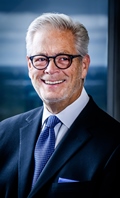 How Much Does Character Matter? How Much Does Character Matter?
The first major study proves a measurable and significant return
by Mark W. Sheffert
May 2015
The role of integrity, ethical behavior and making the right choices (i.e., character) has been one of my favorite topics. As an advisor to boards of directors of troubled companies, I have counseled board members and executives in situations when the temptation to sacrifice doing right in the short term to save the business in the long term was very enticing. I hope that writing about the importance of personality characteristics such as courage, accountability and character may nudge those on the fence to turn back to the right side.
Choosing to do the right thing, instead of the easy thing, was a turning point early in my career. My story was included in Moral Intelligence 2.0: Enhancing Business Performance and Leadership Success in Turbulent Times, written by my friends Doug Lennick and Fred Kiel, Ph.D. (2011). This best-selling book illustrates the monetary and human costs of failed leadership through case studies and interviews with key business leaders.
I cited a situation that occurred when I became chairman and CEO of First Trust, then part of First Bank Systems (now US Bank) in the late 1980s. We had a big problem; our asset positions—which affected our clients’ 401(k) statements—were $8 billion out of balance. This wasn’t something that could be swept under the rug. My management team and our advisors had a wide variety of proposed solutions, some of which included dishonesty with our clients.
I insisted that we tell clients the truth, and that we needed about 90 days to fix our systems. I personally met with our largest clients, which included 3M, General Mills and Medtronic, and asked them to stick with us. By being forthright, we were able to retain the vast majority of our clients. More importantly, my team learned the value of making the right ethical choice.
Unfortunately, these types of success stories are not what we usually hear—it’s the scandalous behavior of Bernie Madoff, Kenneth Lay, Dennis Kozlowski or Tom Petters that makes headlines. That’s part of the reason Fred Kiel and his team at KRW International embarked on a seven-year study of nearly 9,000 employees and 84 CEOs and executive teams at Fortune 500 and 100 companies, privately held firms and nonprofits. They wanted to quantify what Kiel calls “return on character” (ROC) and inspire a movement where people demand character-driven leadership because it not only delivers value to all stakeholders, but it’s the right thing to do. He wanted to prove that who our leaders are is just as important as what they know.
The groundbreaking results of this study are available in Kiel’s book, Return on Character: The Real Reason Leaders and Their Companies Win, recently released by Harvard Business Review Press, (returnoncharacter.com). Kiel discusses how to understand, measure and build character, and reveals the findings of his study. The two most critical findings:
- Executives can develop the habits of strong character and “unlearn” habits of poor character.
- Leaders with stronger morals and principles deliver ROC nearly five times the return on assets than leaders who are self-focused do.
Five times? When Kiel told me that, I practically fell out of my chair. I have known intuitively that leaders motivated by the right moral choices produced greater results than those motivated by greed or self-gain, but I would have never imagined the disparity between the two would be so great.
What is character?
At first blush, the word “character” implies being honest or truthful, but upon more study it embraces more than that. For instance, Abraham Lincoln said, “Character is like a tree, and reputation is its shadow.” Kiel’s research led him to choose four universal moral principles— integrity, responsibility, forgiveness and compassion—to catalog the CEOs in his study, plus several behaviors and habits that support these principles.
His full definition of character: “an individual’s unique combination of internalized beliefs and moral habits that motivate and shape how that individual relates to others.”
Virtuoso CEO vs. self-focused CEO
The employees surveyed by Kiel and his team were asked to rank the behavior of their CEO. The best leaders, whom he calls Virtuoso CEOs, are those who demonstrated the four principles of integrity, responsibility, forgiveness and compassion “almost always,” according to their employees.
Self-focused CEOs were those whose employees ranked them as demonstrating these principles only slightly more than half of the time, and who scored particularly low on compassion.
Old dogs, new tricks?
Kiel’s book provides in-depth narratives about how CEO character influences business results, and how individuals and organizations can improve their character. He also found that our assumptions about character are usually wrong.
It is commonly believed that character is built on a foundation of hard-wired personality traits. However, Kiel, who is also a counseling psychologist, explored new research in the fields of psychology, genetics and neuroscience to determine that character habits can evolve. That means the worst category of self-focused leaders can evolve into virtuoso leaders.
I suppose most of us are somewhere in the middle, so it’s good news to learn it is possible to develop stronger character habits.
Back to Top |



